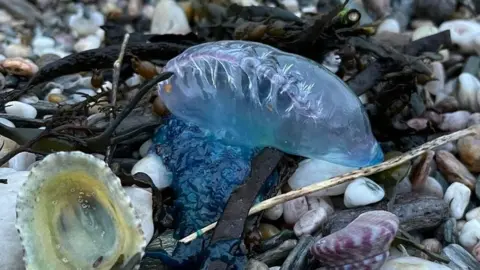Portuguese man o' war warning for south Devon beaches
 Dartmouth Coastguard Rescue Team
Dartmouth Coastguard Rescue TeamPeople are being warned to be careful on beaches and keep their dogs on leads after sightings of stinging creatures similar to jellyfish.
Portuguese man o' war, originally from the Atlantic, have been spotted washed up on beaches in Devon.
Coastguard volunteer, David Bailey found a few while walking on Slapton Sands on Sunday.
Their sting can be "very, very painful" and sometimes "fatal" to dogs if ingested, he said.
Dartmouth Coastguard Rescue Team put out a warning after the marine hydrozoans were spotted at Slapton Sands and Lannacombe Beach.
It advised keeping dogs on leads as the sting can be "toxic" and "in some cases fatal if ingested".
"These give a very nasty sting that lingers, it can sting even when dead on the beach", said the coastguard team.
The photographed Portuguese man o' war measured about 7cm (2.8in) across the float.
'Ended up in the channel'
Mr Bailey said the creatures are not commonly seen on the British coastline in the winter.
They come from warmer climates in the Atlantic, but as a result of south westerly winds and a mild winter "they've floated up and ended up in the channel".
"It's a very stunning creature and... in warmer climates the tentacles can grow up to about 50cm in length."
The Coastguard volunteer said he had not been stung himself, but explained the pain can last up to six hours.
People should "look where you're sitting" on the beach, said Mr Bailey, who explained that they can often be found within seaweed at the high tide mark.
However, he said the coastguard does not get that many reports of people being stung and it "shouldn't put you off going to the beach".

Follow BBC News South West on Twitter, Facebook and Instagram. Send your story ideas to [email protected].
